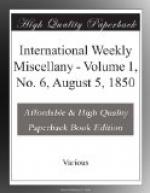... From all her wild green mountains,
From valleys where her slumbering
fathers lie,
From her blue rivers and her welling fountains,
And
clear cold sky—
From her rough coast, and isles, which
hungry Ocean
Gnaws with his surges—from
the fisher’s skiff,
With white sails swaying to the billow’s
motion
Round
rock and cliff—
From the free fireside of her unbought
farmer,
From her free laborer at his
loom and wheel.
From the brown smithy where, beneath the
hammer,
Rings
the red steel—
From each and all, if God hath not forsaken
Our land and left us to an
evil choice;—
“and protest against the shocking anomaly of slavery in a free country. At times, when deploring the death of some fellow laborer in the cause, he falls into a somewhat subdued strain, though even then there is more of spirit and fire in his verses than one naturally expects from a follower of George Fox; but on such occasions he displays a more careful and harmonious versification than is his wont. There is no scarcity of these elegies in his little volume, the Abolitionists, even when they escape the attentions of the high legal functionary already alluded to, not being apparently a long-lived class.
“Toujours perdrix palls in poetry as in cookery; we grow tired after awhile of invectives against governors of slave-states and mercenary persons, and dirges for untimely perished Abolitionists. The wish suggests itself that Whittier would not always
‘Give up to a party what is meant for mankind,’
but sometimes turn his powers in another direction. Accordingly, it is a great relief to find him occasionally trying his hand on the early legends of New England and Canada, which do not suffer such ballads as St. John....
“Whittier is less known than several other Western bards to the English reader, and we think him entitled to stand higher on the American Parnassus than most of his countrymen would place him. His faults—harshness and want of polish—are evident; but there is more life, and spirit, and soul in his verses, than in those of eight-ninths of Mr. Griswold’s immortal ninety.
“From political verse (for the anti-slavery agitation must be considered quite as much a political as a moral warfare) the transition is natural to satire and humorous poetry. Here we find no lack of matter, but a grievous short-coming in quality. The Americans are no contemptible humorists in prose, but their fun cannot be set to verse. They are very fond of writing parodies, yet we have scarcely ever seen a good parody of American origin. And their satire is generally more distinguished for personality and buffoonery than wit. Halleck’s Fanny looks as if it might be good, did we only know something of the people satirized in it. The reputed comic poet of the country at present is OLIVER WENDELL HOLMES,




